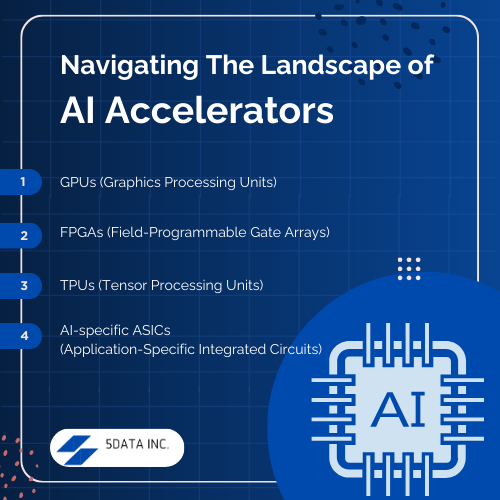This exploration navigates through ML models, deep learning, computer vision, and natural language processing, emphasizing the crucial role of AI accelerators. From the fundamentals of concurrent processing capabilities to the intricacies of specialized hardware, we embark on a comprehensive exploration that aims to engage and enlighten readers on the fusion of coding prowess and Accelerated AI.
Key Takeaways
- Delve into the world of AI accelerators to optimize machine learning coding and enhance efficiency.
- Gain insights into the unique strengths and nuances of different AI accelerators to make informed decisions.
- Consider computational demands, speed, budget, and coding expertise when evaluating AI accelerator options.
- Keep abreast of advancements in AI accelerator technology to ensure smart coding practices and optimal performance.
- Select the ideal AI accelerator to empower your machine learning projects with superior performance and efficiency.
Understanding AI Accelerators
An AI accelerator, also known as a neural processing unit (NPU) or AI chip, is niche hardware designed to accelerate Artificial Intelligence (AI) and machine learning (ML) tasks. These accelerators are tailored to handle the computational demands of algorithmic models, deep learning, and other Artificial Intelligence techniques more efficiently than traditional general-purpose processors. AI accelerators are available in diverse forms, including GPUs, FPGAs, and ASICs).
The primary purpose of an AI accelerator is to accelerate the training and execution of AI models, allowing for faster and more efficient processing. Unlike generic processors, AI accelerators are optimized for the parallel nature of deep neural networks, enabling them to handle complex mathematical operations involved in tasks like image recognition, linguistic processing, and visual computing.
Elevate your digital aspirations with our Best software application development service where expertise meets innovation. Experience the pinnacle of tailored solutions, ensuring your vision is not just realized but surpassed.
Why Accelerate?
Traditional CPUs struggle with the heavy lifting of modern ML, especially training intricate models. Here’s where AI accelerators step in, offering:
- Parallel Processing Power: Imagine splitting your workload across multiple processors, accelerating computations dramatically. That’s the magic of parallelization, a core strength of many AI accelerators.
- Specialized Instructions: Think of these as custom shortcuts for common ML tasks like matrix multiplications and convolutions. They shave off precious time, making your algorithms fly.
- Memory Magic: Forget clunky data access. AI accelerators often boast memory architectures specifically designed for ML, ensuring smooth data flow for optimal performance.
Navigating The Landscape of AI Accelerators
Each AI accelerator species has its strengths and quirks:
- GPUs (Graphics Processing Units): Repurposed from the world of graphics, GPUs excel at parallel processing and high memory bandwidth. But beware, their energy usage can be hefty, and they might not be the best fit for every ML task.
- FPGAs (Field-Programmable Gate Arrays): These chameleons of the hardware world can be programmed for specific ML functions, offering ultimate flexibility. However, taming them requires specialized skills and can be time-consuming.
- TPUs (Tensor Processing Units): Custom-built for TensorFlow workloads, TPUs from companies like Google deliver exceptional performance for specific computational tasks. But remember, they tie you to a specific software ecosystem and limit your programming freedom.
- AI-specific ASICs (Application-Specific Integrated Circuits): Think of these as single-minded ML ninjas designed from scratch for maximum performance and efficiency. However, high development costs and limited availability make them less accessible for individual developers.
Empower your business with the expertise of the Best software application development company. We craft more than code; we engineer digital solutions that redefine excellence, ensuring your vision is not just realized but optimized for success.

Choosing The Right AI Accelerators
The ideal AI accelerator for you depends on several factors:
- Your Mission: What type of ML model are you building (e.g., visual perception, natural language processing)? What are its computational demands?
- Speed Demon or Laid-Back Learner? How much faster do you need your training or inference to be?
- Budgeting for Boost: Balancing performance with affordability is key. Consider how much you can invest in hardware and software.
- Coding Prowess: Do you have the expertise to program FPGAs or use specialized software tools?
The Future Of AI Accelerators
Remember, the AI accelerator landscape is constantly evolving. Keep an eye out for:
- Ease of Use: Some accelerators are more user-friendly than others.
- Power Consumption: This is especially crucial for cloud deployments, where energy efficiency matters.
- Scalability: Can the accelerator grow with your ever-expanding needs?
The rise of edge cloud computing has further emphasized the importance of AI accelerators. In scenarios like industrial automation, where real-time decision-making is critical, deploying machine learning models at the edge can significantly reduce latency. By incorporating advanced AI algorithms into a trained model, developers ensure high performance, enable neural networks to adapt to new models, and seamlessly integrate software updates for continuous improvement.
AI research and innovative AI techniques leverage labeled data and neural systems, deploying edge computing to process specific AI workloads efficiently; a chosen AI accelerator enhances the overall performance by training models with superior speed, signal processing finesse, and compatibility with available hardware, ensuring good performance across diverse operational systems within the sophisticated software stack that these devices offer.
Keep abreast of the latest advancements in the field as the landscape of AI accelerators undergoes swift changes and continuous innovations. Elevate your digital ventures with the Best application development services in the USA. Our expert team combines innovation and precision to deliver tailor-made solutions, ensuring your projects thrive in the dynamic landscape of technology.
Conclusion
AI accelerators play a crucial role in the world of machine learning, enabling faster and more efficient development. By understanding the landscape of AI accelerators, developers can confidently make informed decisions as they navigate the world of AI. The right choice of AI accelerator can significantly impact the overall effectiveness, energy efficiency, and cost-effectiveness of AI applications by giving superior performance. As this field continues to progress, developers and researchers must stay informed about the latest advancements in hardware architecture, programming languages, and development tools to ensure smart coding for rapid machine learning.
AI Accelerators FAQS
1. What is an AI accelerator, and why is it essential for machine learning?
- An AI accelerator is a specialized hardware crucial for machine learning, significantly enhancing computational speed and efficiency by efficiently handling parallel processing tasks, such as those in convolutional neural networks.
2. How do AI accelerators boost AI model performance?
- AI accelerators enhance the performance of AI models by leveraging specialized hardware, such as GPUs and FPGAs, to efficiently increase the parallel processing capabilities, thereby significantly speeding up computations and boosting overall efficiency.
3. Can AI accelerators seamlessly integrate into existing AI systems?
- Yes, AI accelerators can seamlessly integrate into existing AI systems, provided compatibility considerations and appropriate software update adaptation are in place.
4. What industry-specific challenges come with adopting AI accelerators?
- The adoption of AI accelerators may pose industry-specific challenges, such as addressing compatibility issues, ensuring seamless integration, and optimizing for unique computational demands within specific sectors.

Rasmita Patro
Author
